Into the Heart of Africa: Part 8
The words came to me on that last morning in the Serengeti, watching dawn break over the endless plains. Not consciously—more like they’d always been there, waiting for the right story to claim them. Five days from now, when Blood Oath releases, readers will discover how that childhood promise between Alex and her father became the emotional foundation for the entire novel.
But the journey from safari to story wasn’t straightforward. It never is.
The Moment It ClickedI can pinpoint the exact instant Blood Oath was born. We were surrounded by elephants in Tarangire—massive bulls and protective mothers with calves, walking so close to our Land Cruiser that it actually moved. We sat motionless, barely breathing, completely at the mercy of creatures that could crush us without even noticing.
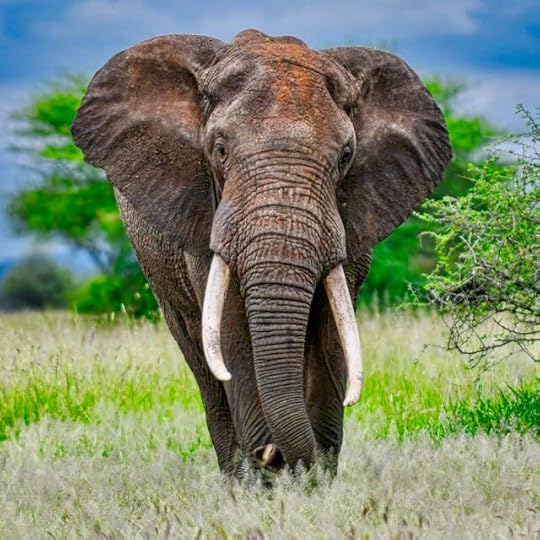
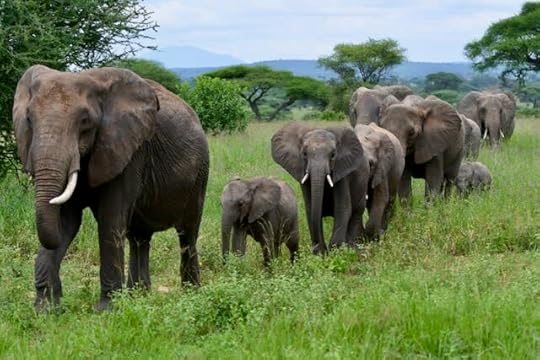
In that moment, I experienced something profound: the simultaneous rush of awe and the stark recognition of our own vulnerability. That feeling—that perfect balance between wonder and terror—became the emotional core of Blood Oath.
When I started writing, I knew Alex’s story needed to capture that same dynamic. She’s one of the world’s most capable operators, yet in Tanzania, she’s powerless. Her father has been taken by rebels. She’s surrounded by beauty that could kill her. She possesses extraordinary skills that mean nothing if she can’t reach him in time.
Real Experiences, Fictional StakesThroughout this series, I’ve shared the real moments from our Tanzania safari:
A passenger’s vasovagal episode on the flight to Amsterdam that reminded me how medical emergencies happen anywhere
The monkey stealing breakfast at the Arusha Serena that introduced us to Africa’s unpredictability
The elephants in Tarangire teaching us about vulnerability and power
The lions in Ngorongoro demonstrating tactical hunting coordination
Sanka and the Maasai showing us that honor codes transcend culture
The endless plains of the Serengeti proving that vastness changes perspective
The leopards on the kopjes revealing how elevation equals survival
Each of these experiences found its way into Blood Oath, transformed by fiction’s alchemy into something both true and invented.
Characters Born from Real PeopleJames Urio, our guide, transformed into James in the novel: knowledgeable, warm, proud of his country. In the book, he’s driving Alex and General Martel when violence erupts. His character represents all the Tanzanians we met who navigate the complex intersection of tradition and modernity, conservation and survival.
Sanka, the chief’s son at the Maasai village, inspired the character of Lemarti—though in reverse. While Sanka embodied dignity and wisdom, Lemarti represents what happens when honor codes become twisted by desperation and exploitation. The talking stick Sanka gave us—that symbol of sacred family responsibility—became the blood oath between Alex and her father.
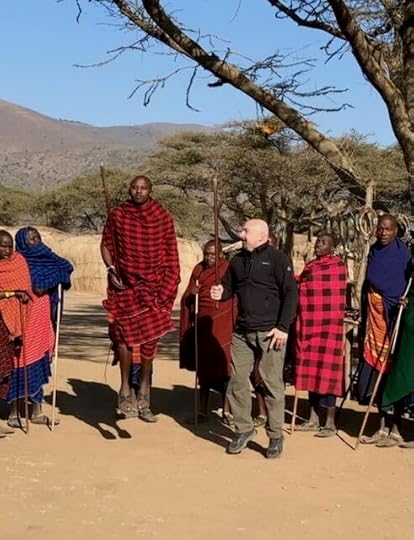
General David Martel is pure fiction, but his relationship with Alex draws from something deeply personal. My daughter lives in London now—an ocean away from Toronto—and I understand completely the paradox of raising someone strong enough to leave while never quite letting go of the promise to always be there if she needs me. When General Martel promises eleven-year-old Alex he’ll always come look for her if she’s lost, he’s making the same promise I’ve made, the same promise countless parents make, knowing our children will go farther than we can follow. The difference is that in the Martels’ world, that promise becomes an operational reality rather than a helpless wish spoken across time zones.
The Writer’s ResponsibilityAfter 30 years as a paramedic and police tactical medic, I’ve responded to terrorist bombings, elevator accidents, building collapses, mass-casualty incidents, and situations where split-second decisions meant life or death. Those experiences taught me what Alex knows instinctively: training takes over when chaos erupts, muscle memory supersedes conscious thought, and sometimes you do the right thing simply because someone needs help, despite the personal risks.
That’s why Blood Oath needed to feel authentic—not just in tactical details, but in emotional truth. When Alex treats the wounded ranger using improvised materials, she’s drawing on the same principles I employed thousands of times. When she makes impossible choices under pressure, she’s operating from the same place every first responder knows: you do what needs doing, then process it later.
The Themes That EmergedAs I wrote Blood Oath, certain themes kept surfacing—themes I hadn’t consciously planned but that emerged from the Tanzania experience:
Sacrifice: What are you willing to give up to protect those you love? For the Maasai, it’s navigating between tradition and survival. For wildlife rangers, it’s risking their lives against poachers. For Alex, it’s everything.
Honor: What codes govern your behavior when law and civilization are absent? Sanka taught us that honor isn’t abstract—it’s choosing the harder right over the easier wrong, every single day.
Connection: What bonds transcend culture, geography, and circumstance? The parent-child relationship, the trust between guide and guest, the shared humanity that emerges when we witness something magnificent together.
Vulnerability: How do you maintain strength while acknowledging fragility? Those elephants taught us that power and vulnerability coexist. Alex learns the same lesson when her father is taken—being capable doesn’t mean being invincible.
The Medical FoundationAlex’s background as a combat medic comes directly from my paramedic experience. When she fashions a tourniquet from a triangular bandage and trauma shears, she’s using techniques I’ve used and taught for decades. When she assesses injuries with practiced efficiency, she’s operating from the same training that becomes instinct after years in the field.
But Blood Oath isn’t a medical thriller—it’s a story about what happens when a healer must become a warrior. Alex’s medical skills save lives throughout the novel, but they also create impossible choices. Do you stop to treat the wounded when doing so might cost your father his life? How do you balance the Hippocratic Oath with the blood oath you swore as a child?
These aren’t abstract questions for first responders, military personnel, or anyone who’s sworn to protect others. They’re daily realities, and Tanzania showed me how to explore them through fiction.
The Technical DetailsI’m often asked how I make the action sequences feel authentic. The answer is research, experience, and respect for the craft.
The weapons Alex uses, the tactics her team employs, the communications protocols they follow—all drawn from extensive research and consultation with experts as well as personal experience. The kopjes that provide tactical advantage in the novel are the same granite outcrops where we watched that mother leopard call to her cubs. The distances, sight lines, and environmental challenges come from our actual safari.
But I also know when to prioritize story over strict accuracy. Blood Oath isn’t a training manual—it’s a thriller that needs to maintain tension while respecting the reader’s intelligence. The balance is delicate: detailed enough to feel authentic, streamlined enough to maintain pace. If I got any of it wrong, that’s on me.
What Tanzania Taught Me About WritingOur safari taught me lessons that transcended the immediate experience:
Patience produces better results: Just as waiting for the perfect photo meant missing a dozen good ones, waiting for the right scene, the right word, the right emotional beat produces stronger fiction.
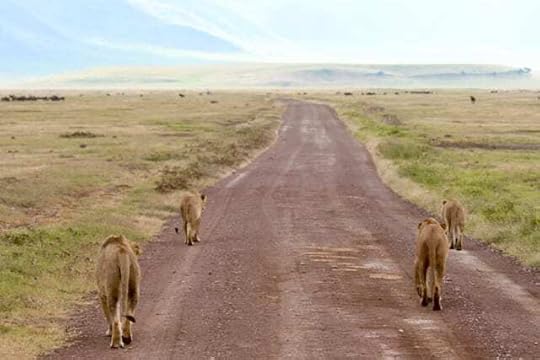
Perspective matters: From ground level, the Serengeti seems infinite. From the air, patterns emerge. Both perspectives are true, and good writing requires both—the intimate and the expansive.
Beauty and danger coexist: The most stunning moments often carry inherent risk. The best fiction embraces that tension rather than resolving it prematurely.
Connection is universal: Whether it’s Sanka sharing his culture, James teaching us about wildlife, or that monkey stealing breakfast, authentic human (and animal) interaction transcends barriers. Characters that feel real forge connections that last beyond the final page.
The Blood Oath ItselfThe central conceit of the novel—that Alex and her father swore a blood oath when she was a child—came from the Maasai talking stick and my own memories of childhood promises. As kids, we make grand declarations: “I’ll always protect you,” “I’ll never leave you,” “I’ll come find you no matter what.”
Most of us outgrow those promises, recognizing them as the beautiful impossibilities they are. But Alex Martel doesn’t have that luxury. She’s built a life around making the impossible possible. When her father is taken, that childhood oath becomes her operational directive.
The physical scar on her palm—matching her father’s—is a constant reminder that some promises transcend childhood. In the novel’s most intense moments, she touches that scar, drawing strength from the bond it represents.
Five Days AwayBlood Oath releases in five days. By the time you read this, review copies are circulating, early readers are sharing reactions, and the machinery of publication is humming toward that November 18th date with destiny.
I’m both excited and terrified, which seems appropriate for a story born from that morning surrounded by elephants—awed and vulnerable in equal measure.
What I hope readers take from Blood Oath isn’t just a thrilling story, though I’ve worked hard to deliver that. I hope they feel the same connection to Africa that I felt, the same respect for the people navigating impossible choices, the same understanding that heroism isn’t about being fearless—it’s about acting despite fear because someone needs help.
Thank You for This JourneyFor eight weeks, you’ve walked beside me through Tanzania. You’ve witnessed elephants touching our jeep, lions hunting zebra, leopards calling to their cubs, and Maasai warriors sharing their culture. You’ve experienced the endless plains where humanity first stood upright and looked toward the horizon.
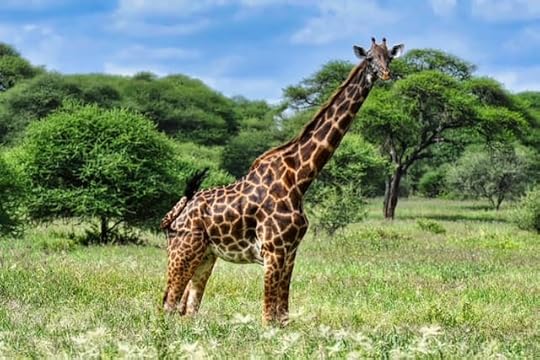
You’ve also witnessed how real experiences become fictional truths—how a safari becomes a thriller, how wonder becomes narrative, how the lessons learned in Tanzania’s wildlife theater become principles that drive a character’s most crucial decisions.
Blood Oath exists because of that June 2019 safari. But it also exists because of three decades as a paramedic, years as a tactical medic, and a lifetime of understanding that the truest adventures aren’t fantasies—they’re reflections of the world as it actually exists: beautiful and dangerous and complex and utterly worth fighting for.
Asante sana to everyone who’s followed this series. To Lynne, Tina, and Joan, who shared the safari. To James Urio, who guided us with wisdom and joy. To Sanka, who opened my eyes to what honor truly means. To every Tanzanian who welcomed us and shared their magnificent country with us.
And to you, dear readers, who’ve trusted me to take you on this journey from safari to story, from experience to fiction, from Tanzania to Blood Oath.
The adventure concludes where it began: with a promise.
Blood of my blood, until my last breath.
See you in the Serengeti.
Steve Urszenyi
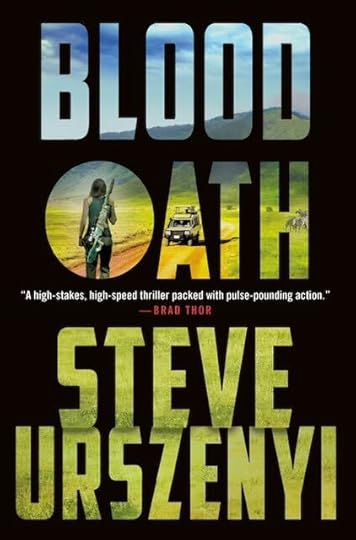
Blood Oath releases November 18, 2025—just 5 days away! Preorder your copy today and discover how the greatest show on Earth inspired Alexandra Martel’s most dangerous mission.
🇺🇸 Amazon US: Order on Amazon US
🇨🇦 Amazon Canada: Order on Amazon Canada
📖 Indigo Books: Order on Indigo Books
🏢 Barnes & Noble: Order on Barnes & Noble
📚 Novel Spot (Local Indie): Order at Novel Spot



